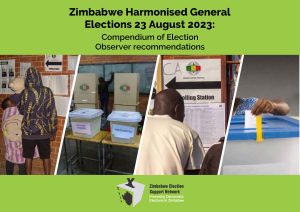Statement on African Charter on Democracy
As Zimbabwe readies for the 2023 harmonized elections, the Zimbabwe Election Support Network (ZESN) implores the government of Zimbabwe to implement electoral reforms in line with the dictates of the African Charter on Democracy, Elections and Governance (ACDEG).
Some of these reforms include; the need to create a conducive electoral environment that will see the effective participation of citizens without fear, as well as reviewing outstanding electoral administration issues which will lead to free, fair and credible elections; enhancing the participation of women; the youth and people with disabilities in electoral processes as candidates and voters; extending voting rights to those in the diaspora and prisons; and the setting up of the Integrity and Ethics Committee to deal with the misdemeanors of traditional leaders in elections. This follows the completion of the formal ratification procedures for ACDEG by the Government of Zimbabwe. After depositing the Instrument of Ratification to the African Union, it means that Zimbabwe has become a State Party bound by the Charter. ZESN and other CSOs have been lobbying for the ratification of the Charter which was signed on the 21st March 2018 at an AU Assembly of Heads of State and Government in Rwanda by President Emmerson Mnangagwa.
